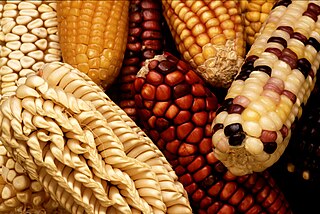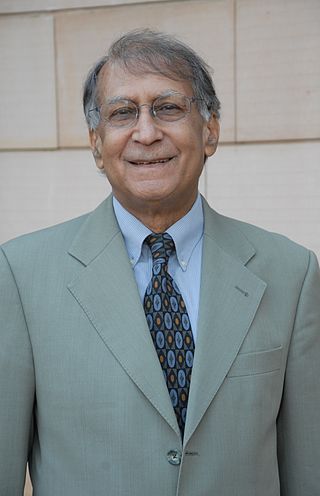Related Research Articles

A seed bank stores seeds to preserve genetic diversity; hence it is a type of gene bank. There are many reasons to store seeds. One is to preserve the genes that plant breeders need to increase yield, disease resistance, drought tolerance, nutritional quality, taste, etc. of crops. Another is to forestall loss of genetic diversity in rare or imperiled plant species in an effort to conserve biodiversity ex situ. Many plants that were used centuries ago by humans are used less frequently now; seed banks offer a way to preserve that historical and cultural value. Collections of seeds stored at constant low temperature and low moisture are guarded against loss of genetic resources that are otherwise maintained in situ or in field collections. These alternative "living" collections can be damaged by natural disasters, outbreaks of disease, or war. Seed banks are considered seed libraries, containing valuable information about evolved strategies to combat plant stress, and can be used to create genetically modified versions of existing seeds. The work of seed banks often span decades and even centuries. Most seed banks are publicly funded and seeds are usually available for research that benefits the public.
The International Treaty on Plant Genetic Resources for Food and Agriculture, is a comprehensive international agreement in harmony with the Convention on Biological Diversity, which aims at guaranteeing food security through the conservation, exchange and sustainable use of the world's plant genetic resources for food and agriculture (PGRFA), the fair and equitable benefit sharing arising from its use, as well as the recognition of farmers' rights. It was signed in 2001 in Madrid, and entered into force on 29 June 2004.

A landrace is a domesticated, locally adapted, often traditional variety of a species of animal or plant that has developed over time, through adaptation to its natural and cultural environment of agriculture and pastoralism, and due to isolation from other populations of the species. Landraces are distinct from cultivars and from standard breeds.

Agricultural biodiversity or agrobiodiversity is a subset of general biodiversity pertaining to agriculture. It can be defined as "the variety and variability of animals, plants and micro-organisms at the genetic, species and ecosystem levels that sustain the ecosystem structures, functions and processes in and around production systems, and that provide food and non-food agricultural products.” It is managed by farmers, pastoralists, fishers and forest dwellers, agrobiodiversity provides stability, adaptability and resilience and constitutes a key element of the livelihood strategies of rural communities throughout the world. Agrobiodiversity is central to sustainable food systems and sustainable diets. The use of agricultural biodiversity can contribute to food security, nutrition security, and livelihood security, and it is critical for climate adaptation and climate mitigation.
Tewolde Berhan Gebre Egziabher was an Ethiopian scientist who won the Right Livelihood Award in 2000 "for his exemplary work to safeguard biodiversity and the traditional rights of farmers and communities to their genetic resources."
Food biodiversity is defined as "the diversity of plants, animals and other organisms used for food, covering the genetic resources within species, between species and provided by ecosystems."

Deforestation in Ethiopia is due to locals clearing forests for their personal needs, such as for fuel, hunting, agriculture, and sometimes religious reasons. The main causes of deforestation in Ethiopia are shifting agriculture, livestock production and fuel in drier areas. Deforestation is the process of removing the forest ecosystem by cutting the trees and changing the shape of the land to suit different uses.
Jack Rodney Harlan was an American botanist, agronomist, plant collector, and campaigner for crop plant biodiversity conservation.
Crop diversity or crop biodiversity is the variety and variability of crops, plants used in agriculture, including their genetic and phenotypic characteristics. It is a subset of a specific element of agricultural biodiversity. Over the past 50 years, there has been a major decline in two components of crop diversity; genetic diversity within each crop and the number of species commonly grown.

Ensete ventricosum, commonly known as enset or ensete, Ethiopian banana, Abyssinian banana, pseudo-banana, false banana and wild banana, is a species of flowering plant in the banana family Musaceae. The domesticated form of the plant is cultivated only in Ethiopia, where it provides the staple food for approximately 20 million people. The name Ensete ventricosum was first published in the Kew Bulletin 1947, p. 101. Its synonyms include Musa arnoldiana De Wild., Musa ventricosa Welw. and Musa ensete J. F. Gmelin. In its wild form, it is native to the eastern edge of the Great African Plateau, extending northwards from South Africa through Mozambique, Zimbabwe, Malawi, Kenya, Uganda and Tanzania to Ethiopia, and west to the Congo, being found in high-rainfall forests on mountains, and along forested ravines and streams.
Forest genetic resources or foresttree genetic resources are genetic resources of forest shrub and tree species. Forest genetic resources are essential for forest-depending communities who rely for a substantial part of their livelihoods on timber and non-timber forest products for food security, domestic use and income generation. These resources are also the basis for large-scale wood production in planted forests to satisfy the worldwide need for timber and paper. Genetic resources of several important timber, fruit and other non-timber tree species are conserved ex situ in genebanks or maintained in field collections. Nevertheless, in situ conservation in forests and on farms is in the case of most tree species the most important measure to protect their genetic resources.
PGRC can refer to:

Ruta chalepensis is a species of flowering plant in the Rutaceae family known by the common name fringed rue. It is native to the Mediterranean and is found elsewhere as an introduced species. It is a perennial herb growing up to 80 centimeters tall. The leaves are compound, each divided into several segments which are subdivided into smaller leaflets. The inflorescence is a cluster of flowers, each with four or five bright yellow petals with rolled, fringed edges. The fruit is a textured capsule which is divided into pointed lobes.
Erna Bennett (1925–2012) was a plant geneticist and one of the early pioneers of genetic conservation. She was one of the first to raise the issue of biodiversity loss at the United Nations.
The Germplasm Resources Unit is part of the John Innes Centre. Located in the Norwich Research Park, Norwich, England, is a germplasm conservation unit and National Capability supported by the Biotechnology and Biological Sciences Research Council. This unit houses a number of internationally recognised reference- and working-collections for wheat, oats, barley and peas, which serves UK and non-UK based academic, industrial and non-industrial groups.
The Seed Savers' Network (SSN) is an Australian not-for-profit organisation, based in Byron Bay, New South Wales. Since 1986, SSN has organised gardeners and farmers to collect, multiply and redistribute garden seeds in Australia and also within peasant organisations worldwide.

Surinder Mohan (Suri) Sehgal is an Indian-American philanthropist with a long career as a crop scientist, seedsman, entrepreneur, and leading global hybrid seed industry expert. His research and professional successes in the areas of plant breeding and genetics, ag biotechnology, intellectual property, business management, and seed industry development were carried out in executive capacities in several companies in the United States, Belgium, and Germany. After the divestment of a group of four seed companies that Sehgal founded and ran with his wife, Edda Sehgal, the couple created two nonprofit organizations to promote rural development in Suri's country of origin: Sehgal (Family) Foundation in 1998 in the US, and S M Sehgal Foundation in India. The foundation focuses on water security, food security, and social justice, particularly empowerment. A proponent of corporate social responsibility and environmental sustainability, Sehgal has also provided support individually and through the foundations for projects related to agriculture research, the preservation of biodiversity and the conservation of natural resources.

Plant genetic resources describe the variability within plants that comes from human and natural selection over millennia. Their intrinsic value mainly concerns agricultural crops.
References
- 1 2 "Melaku Worede (Ethiopia)". Right Livelihood Award. Archived from the original on 30 November 2010. Retrieved 19 February 2011.
- ↑ Feyissa, Regassa; Hodgkin, Toby (2023-08-31). "Melaku Worede, crop genetics leader (1936–2023)". Nature. 621 (7977): 33–33. doi:10.1038/d41586-023-02735-x.
- ↑ Seeds of Freedom
- ↑ "Laureate Dr. Melaku Worede, Pioneer of Biodiversity Conservation, Passes Away". addisinsight.net. 31 July 2023. Retrieved 1 August 2023.
- ↑ Hunduma, Teshome; Tsegaye, Bayush (1 August 2023). "Tribute: Remembering Dr. Melaku Worede: A pioneer crop diversity conservationist and farmers' rights advocate". addisstandard.com. Retrieved 1 August 2023.